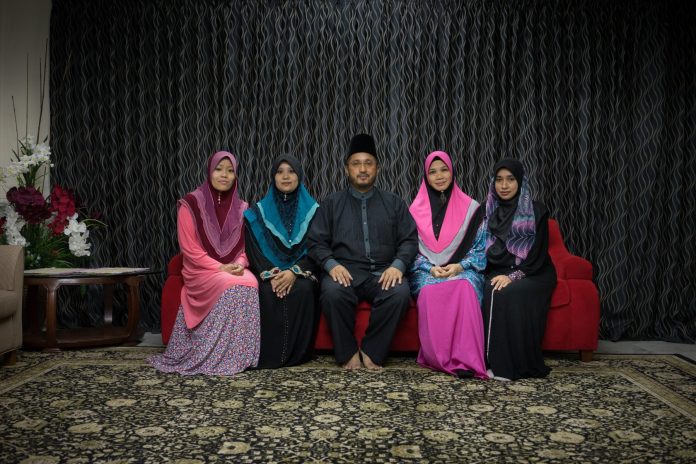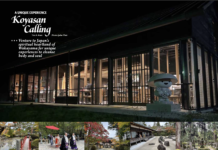
For Malaysian company Global Ikhwan, the rare and controversial practice of polygamy is integral to their way of life
Text Marta Kasztelan/RUOM
Photos Thomas Cristofoletti/RUOM
Driving through the streets of the commuter town of Rawang, 30 kilometres north of Malaysia’s capital city Kuala Lumpur, Azlina Jamaluddin is more than eager to challenge any criticism of polygamous marriage. A born-again Muslim and self-proclaimed “working woman”, the 48-year-old dentist ascribes her professional success and personal growth to polygamy. “I can work, I have more time for myself and I don’t need to take care of my children all the time, as the other wives share the childrearing responsibilities with me,” she shares. Azlina wasn’t always supportive of the practice, however – like many people in Malaysia. Although legal, polygamy is still largely frowned upon in the country. She only considered asking her husband to take another wife after she was introduced to the religious teachings of Global Ikhwan – the “Islamic business” she has been working for since 2001.
Contrary to the commonly held belief that it is mostly men who pursue polygamous relationships, she was the spouse convincing her husband to seek out a second wife. He now also works for the same company as Azlina, and has three wives, having adopted the new lifestyle. “Initially, he wouldn’t have married another woman. He’s just not that kind of guy,” the manager of one of the company’s health clinics explains. Azlina admits that in the early days, she too had doubts about where her newfound faith had brought her. But her love for God and religion took priority over her weariness. “My friends and my mother told me, ‘You are going to join this movement and your husband will marry another woman.’ It worried me for a while. I didn’t know which way to go. I wasn’t in the movement at full blast. But I really loved God and I loved the movement.”

Today, Azlina cannot imagine her life without the company, which is often referred to by the employees of Global Ikhwan (“Global Brother” in Malay), herself included, as a “movement”. It is the fusion of the corporate with the religious that has been raising many eyebrows over the years, as well as the historical links between the business and a banned Islamic sect called Al-Arqam – a reference that Azlina dismisses. “We are a group learning about Islam. And in life you need to eat and you need to live, so for that we have a company. You can call it a movement, you can call it a company.” However, she adds, “You cannot separate the company from the religion.” Founded in the 1960s by Ashaari Mohammad, who had 40 children with his four wives – the maximum number allowed under Malaysian law – Al-Arqam owned a number of businesses and had strict rules regarding Islamic dress codes and behaviour.
The sect was banned by the Malaysian religious authorities in 1994, with five members arrested and detained under the Internal Security Act. At the time, the authorities asserted that the teachings of Ashaari were deviant because they alluded to supernatural powers and promoted unorthodox views about communicating with the Prophet. In the wake of the ban, Ashaari set up an “Islamic business” called Rufaqa, which became Syarikat Global Ikhwan, and was shortened to Global Ikhwan in May 2013.
When Ashaari passed away in 2010, one of his widows, Hatijah Aam, took over his empire, but didn’t manage to keep it out of the limelight for long. In May 2013, she was arrested when returning from Saudi Arabia on charges of trying to resurrect the sect through the company. Hatijah presided over the infamous Obedient Wives Club – an initiative launched by the female employees of Global Ikhwan – which called on women to “be obedient and act like first-class prostitutes” to keep their husbands from straying. The club attracted widespread condemnation domestically and internationally, with human rights watchdogs accusing it of promoting polygamy that was detrimental to women. However, those days of controversy are over, according to current Global Ikhwan CEO, Lokman Hakim, who proudly shows off pictures of his 27 children on his smartphone – 15 from his first wife, eight from the second, one from the third, and three from the fourth.
Following the outrage, he and a few hundred other Global Ikhwan employees attended 500 hours of “rehabilitation courses”, conducted by the Selangor Islamic Religious Department, and, in a public ceremony in October 2013, renounced their beliefs. “We have no more problems with the authorities. You can see my photos with everyone – politicians, businessmen, the prime minister, even with the religious authorities,” the 49-year-old Malay man says, visibly content as he navigates his big Mercedes through the Global Ikhwan estate.
Tucked away in a residential area of Rawang, painted with the Ikhwan signature colour of grass green, the company’s premises resemble a self-sufficient commune. The estate features a prayer room, cafés, a bakery, restaurants, a health clinic – with a maternity ward – a travel agent, a clothing store, a small hotel and a recording studio, where Ikhwan’s entertainment-minded employees produce music and television dramas. Among the company’s core businesses is the production of halal food, which it sells in its supermarkets.

Although Global Ikhwan officially rejected the “deviant” teachings of Al-Arqam, Lokman says, it maintains the Islamic business ethics of the original movement, which focus on the premise of community obligations – “fardu kifayah”. Consequently, the company charges unusually flexible rates for the services it provides. In the company clinic, for example, clients pay as much
as they can afford – those with little means pay nothing. The goal is not to make a profit; rather it is to adhere to good Islamic practices, according to the CEO. “A good Muslim is not simply a person who stays in the mosque or is fasting. A good Muslim is the person who benefits other people,” Lokman explains.
Walking around the facilities, one cannot help but notice the ubiquity of colourful headscarves. “Here we encourage women to work, because they have to contribute to the society. One quarter of the employees are men,” says the chief executive. “The rest are women.” His wives are no different. Linked to the original Al-Arqam sect in one way or another, all of them work or have previously worked for the company. They also attended Global Ikhwan schools or pursued higher education at company-approved universities. Lokman explains that children of Global Ikhwan employees usually go to “normal schools” from the age of seven to 12 and then, depending on their parents’ wishes, further their education in Malaysia or Egypt, concentrating on Islamic studies.
In Malaysia, the company runs 50 educational establishments for children and young adults – all registered with the authorities. Students sit the same exams as those taken at government faith schools, in addition to studying the movement’s religious curriculum. For girls aged 13 and over, the Sekolah Menengah Islam Global Ikhwan is located in Puchong, in the southern suburbs of Kuala Lumpur. Here, daughters of company employees attend classes with orphans or students from families with limited means. The education is free, in keeping with the company’s ideology of “doing good deeds and spreading love”.

“For us at Global Ikhwan, it is so scary to watch the youngsters’ morale degrading so fast in today’s world,” says Wan Nor Fauziah Meor Mohammad, the school administrator. “As Muslims, we need to prepare them, so they can choose between hell and heaven. It is our responsibility.”Accordingly, the students’ lives revolve around prayer and religious studies, Arabic, maths and vocational training that mirrors the corporate activities of Global Ikhwan.
The girls can choose whether they want to pursue gardening or work at a café, a laundrette, a second-hand shop or the nursery, which cares for the infants of school staff during work hours. They also learn how to cook and clean. This, says Lokman, prepares them for employment by Ikhwan, and facilitates intermarriage within its worldwide network of employees. “We are trying really hard to remain a religious business,” Lokman explains. The only means of truly achieving this, he says, is the intermarriage of company employees, who today number 4,000. They come from countries where the business operates: Saudi Arabia – where most of its profits reportedly come from – Egypt, Indonesia, the UAE, Turkey, Jordan, Thailand, Singapore, Australia, Germany and Britain, to name a few. He adds: “It’s easier because we have the same principles and understanding.”
For more stories and photographs from this issue, see Asian Geographic Issue 124, 2017










